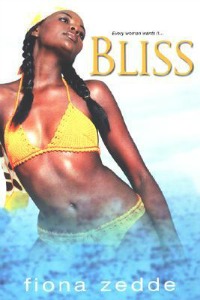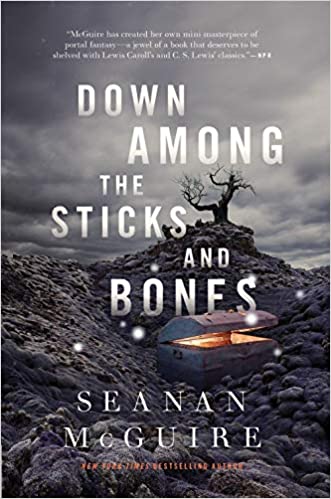Bliss by Fiona Zedde is a finding-your-place story as much as it is a love story; or you could say it’s a love story between a woman and the self she’s supposed to be or the type of life she’s supposed to be living. It’s also highly erotic, reveling in the sensuality of its characters’ bodies, but in a respectful and almost reverential way that elevates ordinary body parts to a sort of glowing, visceral divinity.
Bliss Sinclair, a Jamaican-American woman who goes by Sinclair in honor of her dead mother’s surname, has been living a fairly tropey “money can’t buy you happiness” existence as a high-powered accountant on the gazillionth floor of a fancy building. She doesn’t really have friends who mean anything to her and she tolerates her boyfriend’s affection because it’s what you do. Lesbian identity is sitting on her emotional front porch stoop playing on its phone but she hasn’t quite had the courage to open the door yet.
When she finally does get a chance to figure out that she’s really only attracted to women, she gets taken advantage of by a woman who is pushy and misleading. The inevitable happens, at which point she heads back to Jamaica for an extended vacation to see her father and meet his new wife and kid.
She quickly winds up introduced to the local lesbian community and has to learn everybody’s old drama as she’s also getting used to being around her family again. I found most of the supporting characters and the relational world Zedde sets up for this story really appealing–there’s an immense sense of interconnectedness that includes the dead characters we never get to meet in person as well. Zedde also gives us a rich, vivid, and easy to picture world of tropical plants, Jamaican food, what kinds of things there are to do in Jamaica if you’re there on vacation, and what kinds of jobs the locals do. Whiteness hovers in the background as a clueless, absent employer but is never really present on-screen.
There is a lot of sex in this book, but there are also a lot of scenes of the main character playing tourist on beaches and historic buildings, going to parties or restaurants, enjoying time with her family, etc. I just feel like if I had been counting the sex scenes I would have run out of fingers (and yes, I phrased it that way on purpose 😛 )
This is not a book that ignores the violent reality that anyone visibly queer in Jamaica may encounter, but because Zedde is writing from the inside and not from the point of view of some privileged white non queer writer, both the book’s scenes of attempted sexual violence from the hands of multiple strange men are:
- foiled, completely and utterly
- take up a very brief space in the narrative; they occur over the course of a page or two, are fended off, are processed emotionally with tears or a day of quiet or whatever else is necessary, and then we move on
- they are not intended as a rejection of Jamaica. This is important. Over at WritingWithColor, we all get questions from people outside various marginalized groups trying to write about the ways that group mistreats vulnerable folks within its own LGBT community. I prefer to leave this narrative to people in the overlap of both groups, because comparing what Zedde writes to what some of these privileged writers write you can see the difference — at one point, one of the Jamaican lesbians even says “you have to love Jamaica anyway.” This is home; the food, the culture, the scenery, the history, the music. The problem is recognized but it’s not enough to drive them out and away into other places that may very well be just as physically dangerous.
I found the main character herself more appealing as a person than any of her love interests, honestly — obviously the first one was pushy beyond belief, but one on the island came on really strong as well and I had to just believe in Sinclair’s immense attraction to her being what wore down her initial “I have a broken heart and you come on super strong, meep” feelings.
Another topic about which Zedde writes much better than a privileged person trying to write about a marginalized community further marginalizing its LGBT members, is Sinclair’s father’s reaction to her lesbianism. I was stunned at how well this was pulled off because I’d never seen a character come around so realistically and so quickly. He’s upset, but a few pages later he dials it back and says that a lot of his upset is probably unfair. Can white, non-queer people trying to write about “oppressive” non-white or non-American parents please take a lesson from this book?
Anyway, aside from that issue I thought it was a great and realistic and familiar depiction of what happens when a parent who loves their child has discomfort with their choice of partner or sexuality but is trying to work around it. We don’t see too much of that in LGBT fiction; I’ve seen a lot of either ultra-acceptance (realistic for some of us, and even those who aren’t need some wish fulfillment) or ultra-disgustingness (cathartic and important to write from the inside; tragedy porn and sometimes not even written in a way that rings true, when writing from the outside.) A family that invites a girlfriend over for dinner and no horrible “I knew you’d ruin the evening!” argument happens even though one of the members feels negatively about the idea of a gay daughter is another way to be realistic, and belongs on the page. And it’s not like you as a reader are constantly made aware of his negativity, either.
Some choice quotes, so you can get a feel for the book’s snappy dialogue and evocative descriptors:
Sinclair: “Do you come downtown often?”
First girlfriend: “If you’ll let me, I’ll come at least two times today.”
Waitress: “Can I get you two anything to drink today?”
One of the main characters, about the other main character: “Some manners for her.”
Island love interest about the first girlfriend: “If she was worth half your sighs she would have been here with you on her knees apologizing for hurting you.”
Description of main character’s young stepmom: “short reddish hair that stood up around her head like a tamed flame”
Overall, the story tells itself; it flows really well and makes you want to keep reading. This isn’t the kind of book where you read a paragraph and then have to read it again because you didn’t catch what happens. In other words, Also, kudos to Zedde for using the phrase “maggot-white penis” to refer to a naked white guy in a BDSM club, because it reminded me of those posts pointing out how nobody talks about whiteness with the kind of evocative overscrutinizing detail usually afforded to darker skin in fiction.
Trigger warnings: two foiled attempts at sexual assault by multiple men in the Jamaica half of the book. The second time the women beat up the men pretty badly; it’s over quickly and you can skip the second time if you nope out for a couple of pages when they get to a place in the woods with tons of pretty tropical flowers.
Also, the first girlfriend’s behavior is borderline abusive in the sense that she puts Sinclair in situations she doesn’t want to be in and basically demands a veto as negative consent instead of asking if things are okay beforehand, and I’m talking big deal things like surprising her with orgies or kink clubs. Sometimes they are okay and sometimes they are not and Sinclair takes steps accordingly each time. Plus, she’s the kind of person who says “You’re an incredible fuck. Yet you’re so naïve. You’re like my lost childhood. My virginity.” which I know someone who had that said to them in real life and I’ve always found it super creepy (so does Sinclair.)


